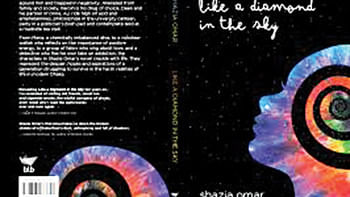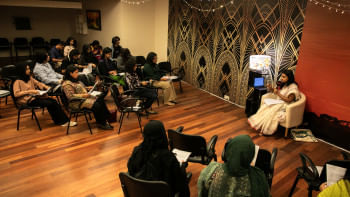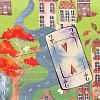In conversation with Shazia Omar: Fiction, wellness, readership, and everything in between

Like an elusive nursery rhyme, the name Like a Diamond in the Sky (Penguin Books India, 2009) drew our eyes to a tiny book stall outside a conference. The subject matter in the blurb spoke of a 21-year-old drug-addled youth in the throes of a dying Dhaka city. Having put it off for a long time, the both of us only ended up reading it after one of us had finally read the book and raved about it to the other. After reading, annotating, and discussing at length, we finally sat down to talk to the ever-dazzling and unlikely architect of such a grim book—Shazia Omar.
When asked about when and how she had come into the world of writing, Omar told us that she had started writing stories from as early as grades one and two. In time, she understood that writing a novel was more than just creativity and imagination; it required structure. As she matured as a writer, she learned to structure her writing following her Master's in Social Psychology. We were curious to know what had prompted her to write a novel as dark as Like a Diamond in the Sky. "I had a lot of friends who went through addiction." she recalled. "Due to the thesis I wrote for my Master's degree, I came in close proximity with those who had gone through the phases of addiction, many of whom had suffered some sort of loss in their lives."
Moving on to the protagonist, Deen, and his treatment of faith in the novel, Shazia Omar said, "I was getting into Sufism, Rumi, and the concept of deen duniya. My character is named Deen because of that, and also because of Deen Moriarty—the beatnik hero of Jack Kerouac's On the Road, which I love. I tied that Sufism-inspired struggle within Deen, where he wants to escape into the realm of the spiritual world but is too tied to the material world because of the drugs he used. I wanted to play with this duality."
She told us about the "drug stories" emerging from different places that represented their junkie subcultures, but the stories of Bangladesh were yet to be told. "I grew up in Canada, and when I came to Bangladesh, I found that a lot of addicts I met had no idea about the addictive nature of the drugs they were using. So, I wanted there to be conversation surrounding this issue," she said.
We were then curious to know what may have brought on the depiction of Dhaka city as a landscape wasting away, in contrast to Deen's addiction. Ms. Omar sighed, "Dhaka has some pretty toxic elements. Now that I have lived here for some time, I have become desensitised to it. But when I first came here, it would affect me a lot—all the people on the streets with their babies and no food. It was horrendous." She went on, "It's hard to be super positive in this toxic environment unless you do drugs and block it out. I feel like that's what I was seeing around me. I wrote the book as a battle cry."
With that thought, we moved on to her next work, Dark Diamond (Bloomsbury, 2016) which is a work of historical fiction depicting the life of Lord Shayista Khan, the Mughal Viceroy of Bengal. "There was a lot of backlash about a Bangladeshi writing something bashing Bangladesh, which is why I went on to write my next novel, Dark Diamond, representing Bangladesh at its peak," explained Omar. We asked if writing such a factual book was difficult, in comparison to her first fictional work. "I chose a man as the protagonist of my first novel so that I could delve into something away from myself. So, I had a lot of fantasy and fictional elements to discover through that novel. However, my second novel was much more factual, and less experience-based. It was hard, but the more you can draw from your reality, the stronger your writing will be."
Shazia Omar is an avid lover of wellness and regularly practises and teaches yoga. Concerning her love for well-being, we asked her about the wellness book she co-authored, called Intentional Smile (Bloomsbury Publishing, 2016). "It's my favourite thing I've ever written. It was such a fun process because it was done with two friends. It was also nice because I could see my ideas turn into illustrations and come to life. I myself have suffered from depression and, in these moments, yoga and many of the concepts I touched upon in that book have been integral to my well-being, and hopefully to all those who read the book."
When asked about the difference in experience she had when writing both fictional and nonfiction texts, Omar explained that although it was very different, she enjoyed both. She went on to talk about two of her upcoming projects, a work of fiction and the other a nonfiction project based on yoga. "Honestly, fiction is the most torturous," she added, "It tangles your brain and plays with your emotions. It's an emotional roller coaster. Nonfiction is not like that; it's just information and I fill it with positivity. With fiction, I have to be more careful not to get too tangled up in it." She also noted that fiction requires a good chunk of time to pen down, unlike nonfiction, which can be done sporadically.
As we neared the end of our interview, we wanted to know Omar's stance, as a Bangladeshi author, on the field of writing in Bangladesh, and whether or not she was hopeful about the future. "I would like to see more writing coming out of Bangladesh. We are still behind," she said. She then told us of a writer's group called "Writer's Block", which has been running for the last 15 years. She said solemnly, "I had hoped to see many published by now, and some have done so, but I still don't feel we have much of a community for full-time authors. We are lacking in publishers, we don't have many literary journals, and even our readership in English is pretty small." As a Bangladeshi author writing in English, she hoped that more schools and universities would include Bangladeshi authors in their curriculum, making the possibility of being an author in Bangladesh achievable, and giving students the chance to see more of themselves in the curriculum.
When asked about the current readership of the country, Omar said, "It also needs improving, now that kids always have a smartphone in their hands. I recently saw a meme that said, 'Reading books is like travelling. If you read only one book, it's like never going anywhere new in your life.'" And with this tidbit of enlightening humour, our conversation came to an end.
Tasnim Naz is an academician of English Literature at Bangladesh University of Professionals. Her research interests are Feminism, Diasporic Study, and Postcolonial Studies. Reach her at [email protected].
K.M. Arefin is a faculty member at Bangladesh University of Professionals and a researcher of postcolonial Bengali literature. Reach him at [email protected].

 For all latest news, follow The Daily Star's Google News channel.
For all latest news, follow The Daily Star's Google News channel. 









Comments